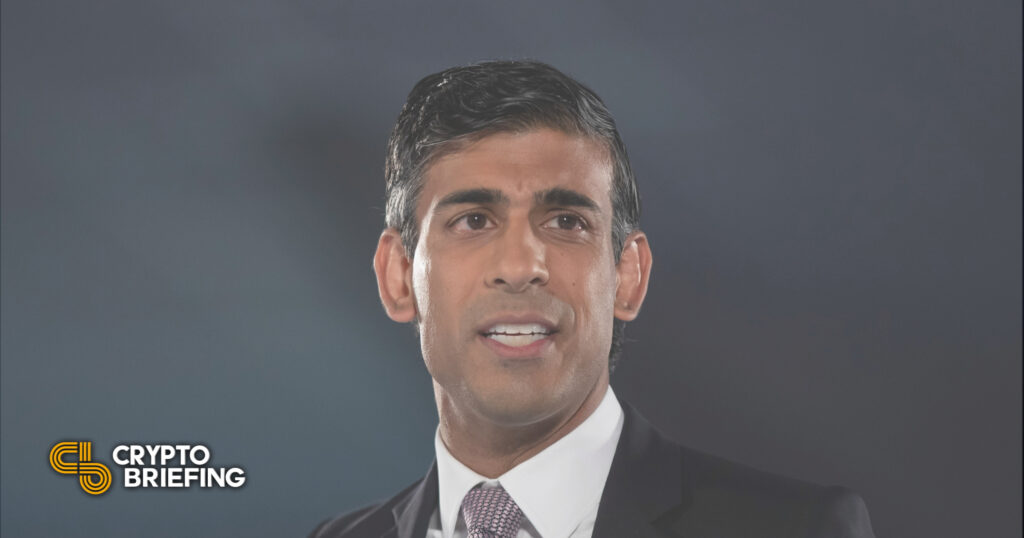Key Takeaways
- Rishi Sunak has emerged as the next expected Prime Minister of the United Kingdom.
- Rishi Sunak seems to have a positive view of crypto, blockchain and distributed ledger technologies.
- While the path forward is uncertain, his appointment could very well lead to pro-crypto policy change in Britain
Share this article
The appointment of Rishi Sunak as the new British Prime Minister could benefit Britain’s fast-growing crypto industry.
Britain gets a new prime minister
Rishi Sunak will be Britain’s next Prime Minister.
The news broke Monday after rival candidates Penny Mordaunt and former Prime Minister Boris Johnson withdrew from the Conservative Party leadership election, leaving Sunak as the de facto winner.
Following the resignation of the previous Prime Minister, Liz Truss, on October 20, the ruling Conservative Party began the process of electing a new leader and Prime Minister. Truss, who took over from Boris Johnson on September 5, was pressured to resign after just 44 days in office. Her economic “mini-budget” plans, which included substantial tax breaks for top earners, were heavily criticized by both the general public and members of her own cabinet.
Sunak will inherit the British premiership at a turbulent time. Throughout 2022, rising inflation has put pressure on the global economy. In Britain, the consumer price index recorded an annual increase of 10.1% in September, returning to July’s highs and indicating that inflation is likely to remain elevated for longer. Energy supply problems following Russia’s invasion of Ukraine have only exacerbated Britain’s economic problems, causing domestic energy bills to rise by a further 80% in early October.
It is still unknown how Sunak will tackle Britain’s pressing economic problems. The new prime minister has yet to form a cabinet or present policy plans to the general public. While Sunak’s economic strategy is still unknown, his appointment could see a continuation of several pro-crypto policy decisions made during his tenure as Chancellor of the Exchequer between 2020 and 2022.
Sunak’s Crypto Stance
Rishi Sunak seems to have a positive view of crypto, blockchain and distributed ledger technologies.
While stepping down as Chancellor in April 2021, Sunak proposed that HM Treasury and the Bank of England set up a taskforce to investigate the creation of a central bank digital currency. CBDCs, as they are more commonly known, are digital currencies issued by a central bank rather than a commercial bank. They are widely believed to use blockchain technology to verify transactions between parties, similar to the Bitcoin or Ethereum networks.
The exploration of a CBDC is in line with the Treasury’s aim to help fintech companies scale and ensure Britain remains at the forefront of the digitalisation of finance. To this end, the new task force would also explore the use of distributed ledger technology for private sector applications.
In April 2022, Sunak doubled down on his commitment to crypto when he released plans to make Britain a global hub for crypto technology. At the forefront of these plans has been a call for stablecoins to be recognized as a valid payment method, a move that could significantly boost the UK crypto industry.
The report also highlighted that the ‘financial market infrastructure sandbox’ built in 2015 would continue to allow crypto companies in Britain to innovate without the fear of clashing with regulators. Additionally, the Treasury would work with the Royal Mint to produce an NFT and explore ways to increase the competitiveness of the UK tax system to encourage further crypto development. “My ambition is to make Britain a global hub for crypto asset technology, and the measures we have outlined today will ensure businesses can invest, innovate and scale in this country,” Sunak said.
Under Sunak’s chancellorship, the British government’s pro-crypto stance continued. HM Treasury confirmed that stablecoin legislation would be part of Britain’s new Financial Services and Markets Bill. It is also worth noting that the UK government’s approach to crypto regulation has been very fair to industry stakeholders. The Ministry of Finance has launched several ‘calls for evidence’ and sought feedback from the public, such as when it sought the opinions of investors, professionals and companies involved in decentralized finance to help draft tax legislation.
When Sunak left his position as Chancellor of the Exchequer ahead of Prime Minister Boris Johnson’s resignation on July 7, it put the UK’s pro-crypto approach into question. There was no guarantee that the next administration would promote crypto innovation or implement fair regulations. Nadhim Zahawi, interim chief of the Treasury after Sunak’s resignation, had previously indicated he favored blockchain technology. However, it was unclear for Zahawi’s replacement, Kwasi Kwarteng, whether he would continue Sunak’s pro-crypto commitments.
With Sunak set to return to government – as Prime Minister, no less – the future of crypto innovation and regulation in Britain is looking clearer. In his new role, Sunak is likely to appoint a Chancellor of the Exchequer who shares his positive views on crypto technology. But with Sunak becoming the third British prime minister to take office since the last general election in 2019, his future is far from assured. He will have to convince both parliamentarians and the general public that he is up to the task, to avoid being pressured to call elections (current opinion poll data indicates that he would probably lose an election to the British opposition Labor party). While Sunak’s appointment is generally good news for crypto in Britain, it remains to be seen whether he can maintain his position in the coming months.
Disclosure: At the time of writing, the author of this piece owned ETH, BTC, and several other cryptocurrencies.
Share this article


